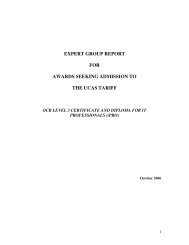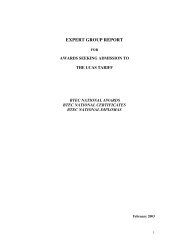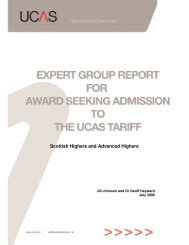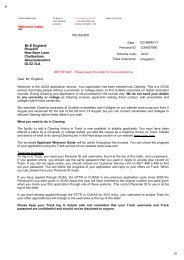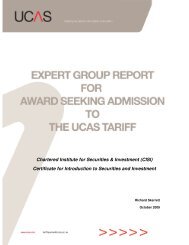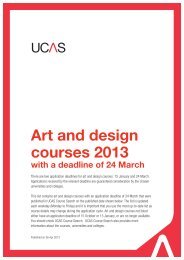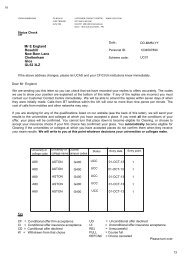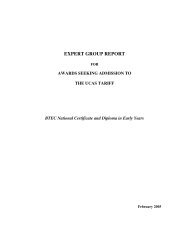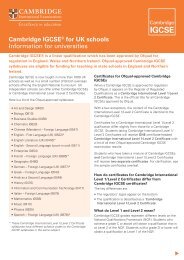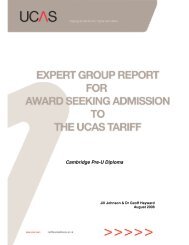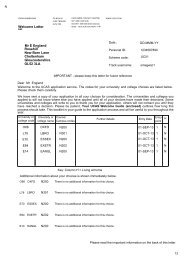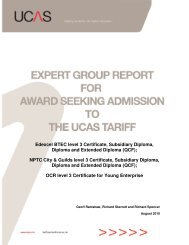International qualifications 2013 (pdf) - CUKAS
International qualifications 2013 (pdf) - CUKAS
International qualifications 2013 (pdf) - CUKAS
Create successful ePaper yourself
Turn your PDF publications into a flip-book with our unique Google optimized e-Paper software.
Qualifications currently offered<br />
ACCESS TO HIGHER EDUCATION<br />
Admission is made on the basis of completed upper secondary<br />
education and a national entrance examination. Post-school<br />
education is provided by public and private universities, HE and<br />
research institutes, and teacher training colleges.<br />
The Tot Nghiep Dai Hoc (bachelor’s degree) is comparable to a<br />
British bachelor’s (honours) degree and is awarded after four to<br />
six years of study.<br />
West Indies/Caribbean<br />
In this context, the West Indies is taken to be the following<br />
English-speaking Caribbean Commonwealth territories which<br />
have a considerable measure of shared educational tradition<br />
and practice:<br />
Anguilla, Antigua and Barbuda, Bahamas, Barbados, Belize,<br />
Bermuda, British Virgin Islands, Cayman Islands, Dominica,<br />
Grenada, Guyana, Jamaica, Montserrat, St Kitts/Nevis, St Lucia,<br />
St Vincent and the Grenadines, Trinidad and Tobago, Turks and<br />
Caicos Islands.<br />
EVALUATION<br />
Caribbean Examinations Council, Caribbean Secondary<br />
Education Certificate (CSEC)<br />
Acceptable at the General or Technical Proficiency levels on a<br />
subject for subject basis in lieu of GCSE, provided that grade III<br />
or better has been achieved. Would require to be supplemented<br />
by Caribbean Advanced Proficiency Examinations (CAPE),<br />
GCE A levels, Scottish Highers or Advanced Highers, or a bridging<br />
course.<br />
Caribbean Examinations Council, Caribbean Advanced<br />
Proficiency Examination (CAPE)<br />
Acceptable at the two-unit level in lieu of GCE A levels on a<br />
subject for subject basis.<br />
Overseas Examinations of UK Awarding Bodies<br />
Some prospective candidates for HE in the UK will have prepared<br />
on the basis of GCSE and A level examinations (see Appendix A).<br />
College of the Bahamas Associate Degree Programme<br />
Acceptable as a group qualification satisfying general<br />
entrance requirements.<br />
Barbados Community College Associate Degree Programme<br />
Acceptable as a group qualification satisfying general<br />
entrance requirements.<br />
Bermuda Secondary School Certificate (BSSC)<br />
Acceptable in lieu of GCSE on a subject for subject basis,<br />
provided that a grade-point average of 2.0 has been achieved.<br />
Would require to be supplemented by GCE A levels, Scottish<br />
Highers or Advanced Highers, or a bridging course.<br />
Bermuda College University Transfer Programme (Diploma in<br />
Arts and Science)<br />
Acceptable as a group qualification satisfying general<br />
entrance requirements.<br />
GRADING SYSTEM<br />
CSEC<br />
I, II, III (minimum acceptable) ... VI<br />
There is no pass/fail mark.<br />
CAPE<br />
I<br />
II<br />
III<br />
IV<br />
V<br />
VI<br />
VII<br />
Excellent<br />
Very good<br />
Good<br />
Satisfactory<br />
Acceptable<br />
Limited<br />
Very limited<br />
College of the Bahamas Associate Degree Programme<br />
4.00 – 3.45 Distinction<br />
3.44 – 2.85 Credit<br />
2.84 – 2.00 Pass<br />
Barbados Community College Associate Degree Programme<br />
Letter Mark Definition Grade Point<br />
A* 100 – 90 Exceptional<br />
A 89 – 80 Excellent 4.0<br />
B+ 79 – 75 Very good 3.5<br />
B 74 – 70 Good 3.0<br />
C+ 69 – 65 Fairly good 2.5<br />
C 64 – 60 Satisfactory 2.0<br />
D 59 – 50 Passing 1.0<br />
F 49 – 00 Failing 0.0<br />
BSSC<br />
A 4.0 Outstanding<br />
B 3.0 Very good<br />
C 2.0 Good<br />
D 1.0 Satisfactory<br />
E 0.0 Unsatisfactory<br />
Bermuda College University Transfer Programme (Diploma in<br />
Arts and Science)<br />
Individual subjects:<br />
A Excellent 4.0<br />
B Good 3.0<br />
C Satisfactory 2.0<br />
D Pass 1.0<br />
E Fail Fail<br />
Overall classification: Grade Point Average (GPA): 3.50 minimum<br />
award for Distinction, 3.00 minimum for Merit, 1.50 minimum<br />
for Diploma.<br />
EDUCATION SYSTEM<br />
Although there are local variations, the common structure<br />
throughout the West Indies/Caribbean is six years of primary<br />
education followed by five years of secondary education leading<br />
to the Caribbean Examinations Council (CXC) Secondary<br />
Education Certificate (CSEC) or to GCSE or their equivalent.<br />
A further one to two years may lead to the Caribbean Advanced<br />
Proficiency Examination (CAPE) and two years may lead to<br />
A levels of UK Awarding Bodies.<br />
CAPE was first administered in May/June 1998, by the CXC.<br />
CAPE syllabuses are structured as one- or two-unit courses.<br />
A one-unit course consists of three modules, 150 credit hours,<br />
which include contact time and time spent on projects and other<br />
assignments. The unit is based on content, knowledge and skills<br />
drawn from specific subject areas. A two-unit course consists of<br />
two one-unit courses designed to cover a well-defined subject<br />
area and to contain the core content of the A level and additional<br />
content considered to be relevant to the needs of the region in a<br />
global environment. Each unit is separately examined and<br />
certified by internal and external examiners.<br />
CXC has introduced Associate Degrees in nine areas: business<br />
studies, environmental science, general studies, humanities,<br />
INTERNATIONAL QUALIFICATIONS 65



